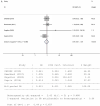Oral Anticoagulant and Antiplatelet Therapy for Cervical Artery Dissection: A Meta-Analysis of Clinical Trials
- PMID: 34846211
- PMCID: PMC8647220
- DOI: 10.1177/10760296211051708
Oral Anticoagulant and Antiplatelet Therapy for Cervical Artery Dissection: A Meta-Analysis of Clinical Trials
Abstract
Carotid and vertebral artery dissections are estimated to account for ∼20% of strokes in patients under 45-years-old. This meta-analysis compared the efficacy and safety of treatment with anticoagulants versus antiplatelet agents to determine the optimal therapy. We searched 4 electronic databases for clinical trials published from January 1, 1980 to August 25, 2021 that included patients who received anticoagulant or antiplatelet therapy for carotid and/or vertebral artery dissections. The curative effect was judged by recanalization evaluated by imaging. The primary outcomes were all cause death and ischemic stroke; secondary outcomes included hemorrhage and transient ischemic attack (TIA). Patients who received only a single drug treatment were divided into antiplatelet or anticoagulant groups; all received conservative treatment without surgical intervention. For this investigation, we pooled the available studies to conduct a meta-analysis, which included 7 articles with 1126 patients. The curative effect of vascular recanalization was not significantly different between the 2 treatment groups (odds ratio [OR] = 0.913, 95% confidence interval [CI]: 0.611-1.365, P = .657); similarly, no significant differences were found regarding the primary outcomes all cause death (OR = 1.747, 95%CI: 0.202-15.079, P = .612) and ischemic stroke (OR = 2.289, 95%CI: 0.997-5.254, P = .051). Patients treated with anticoagulants were more likely to experience TIA (OR = 0.517, 95%CI: 0.252-1.060, P = .072) and hemorrhage (OR = 0.468, 95%CI: 0.210-1.042, P = .063), but the differences were not statistically significant. Overall, there were no statistically significant differences between anticoagulant therapy and antiplatelet therapy for the treatment of carotid and vertebral artery dissections.
Keywords: anticoagulant; antiplatelet; carotid artery dissection; stroke; vertebral artery dissection.
Conflict of interest statement
Figures






References
Publication types
MeSH terms
Substances
LinkOut - more resources
Full Text Sources
Medical

